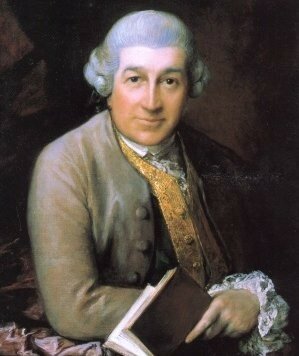No comment
I'll leave the following poem to your sagacity. It's taken from the following opus:
A
collection of original poems. By the Rev. Mr Blacklock, and other Scotch
gentlemen. Edinburgh, 1760.
The last two lines are an imitation of Pope's "An Essay on Man".
An elegy on
a Bass Viol, broke by a short-sighted gentleman, who sat down upon it.
Vitaque cum gemitu fugit indignata sub umbras.
I had a
bass – Ah me ! it is no more;
Dumb are
those strings so ready once to roar.
To gloomy
hell the heav’n-taught spirit flies,
And here
the head, and there the body lies.
Poor
breathless thing! if I ever forget
Thy once
lov’d music, may I share thy fate.
No, gentle
bass, like WILLIAM shalt thou be,
Of
glorious and immortal memory.
Can I
forget thy reverend grimace,
Thy solemn
form, and philosophic face?
Can I
forget thy soul-inchanting song,,
Sweet,
though sonorous, delicate, though strong?
With wanton
notes your voice ne’er brib’d the ear,
Nor were
old Cato’s moral more severe.
Like Cato
too you fled from solitude,
And thought
society your greatest good.
Whene’er
you sung, you help’d another’s strain,
And was to
fiddles, what he was to men.
Unhappy
viol! why before thy time
Did the
fates snatch thee humming in thy prime?
To thee
untimely death if they decreed,
Why did
they sever from thy trunk thy head?
Nor Whig
nor Tory was you when alive,
Nor arm’d
rebellious in the forty-five;
Could not
the Sisters other death afford
Than that
which honour’d many a rebel Lord?
Tell, O
Melpomene! in mournful strain,
By what foul means my luckless bass was slain.
A plain,
good, simple, honest man there was,
Nor friend
nor foe to this unhappy bass;
Blind men,
and those that have their eyes, between,
Nature had
plac’d him in a purblind mean:
Tir’d with
the tuneful labours of the day,
As on a
chair your bass reposing lay,
Thy evil
genius made this man appear.
Tha bass he
saw not, though he spy’d the chair.
Souce down
he sits – when, lo! strange sounds were heard,
And sad
hoarse groans the purblind mortal scar’d.
With foul
embrace your viol was oppress’d –
I can no
more – yourself may guess the rest.
Curs’d be
the wretch, from whence soe’er he come;
Accurs’d
his eyes, but more accurs’d his bum.
A shrew’s
sharp nails have many a visage flea’d.
And English
boxers vanquish with their head:
But of all
mortals stigmatiz’d in verse,
He first
has murder’d with a monstrous ---
With horror
I, O bass! thy fate must view;
Not only
death, but ignominy too!
Had some
fait she, with bum as white as snow,
Dealt thy
devoted neck the fatal blow,
Pleas’d to
the last you’d dy’d in chearful mood,
“And kiss’d
the --- just rais’d to shed thy blood.”*
*Pleas’d to
the last, he crops the flow’ry food,
And licks the hand just rais’d to shed his blood. POPE
Not sure Pope would have approved. Alexander Pope and His Dog, Bounce (1718), Jonathan Richardson

/https%3A%2F%2Fprofilepics.canalblog.com%2Fprofilepics%2F3%2F1%2F318171.jpg)











